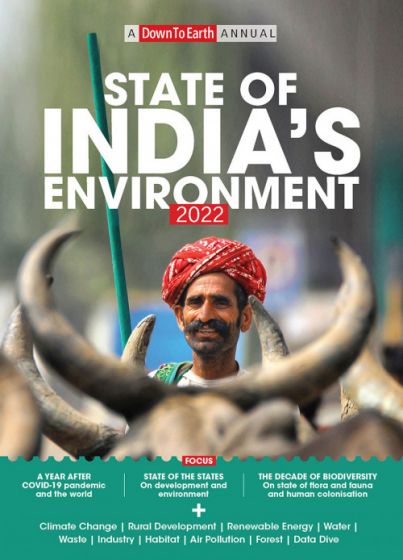CSE and Down To Earth’s Annual State of India’s Environment 2022 report released by Union environment minister Bhupender Yadav
“We have built infrastructure for a long time in this country – now we are focusing on redistributing the resources of the state to the poor” – said Yadav
For details of AAD 2022 and all its presentations and proceedings (streamed live as well as recorded)
The AnnualState of India’s Environment 2022 report is available here on sale Click here
New Delhi/Nimli: March 1, 2022: “Reducing consumption and forming a self-restrainedsociety is the only way that we can live with nature harmoniously,” said BhupenderYadav, Union minister of environment, forests and climate change, speaking at an annual conclave of journalists organised by Centre for Science and Environment (CSE). Yadav released Down To Earth’s Annual State of India’s Environment Report 2022 on the occasion.
Anil Agarwal Dialogue, as the four-day conclave is called, is back in its physical form after a pandemic- and lockdown-induced hiatus of almost two years. The event, which has over 60 journalists participating from across India, is being held at CSE’s state-of-the-art residential environmental training facility, the Anil Agarwal Environment Training Institute (AAETI), in Nimli, Alwar district, Rajasthan.
Speaking at the conclave, CSE director generalSunitaNarain said: “In the last two years, the world has seen disruption at a scale not seen before. Both Covid-19 and climate change are the result of our ‘dystopian’ relationship with nature -- call this the revenge of nature. Covid-19 is because we are breaking the barrier between the wild habitats/humans and the way we produce our food. And climate change is the result of emissions needed for economic growth – fossil fuels are unsustainable; our lifestyle is the problem.”
“Both are also linked, and are being exacerbatedbecause of our mismanagement of health systems and the environment,” she added.
Yadav highlighted three extremely critical issues that confronts the nation today -- climate change, desertification, and the sustainability-affordability linkage. He said: “We can change people’s lives by linking affordability with sustainability. We have to link traditional knowledge with scientific temperament; we sometimes are so proud of traditional knowledge that we forget logic. But we have to think of logic and affordability along with tradition to make it work.”
Answering questions addressed to him by the assembled journalists, Yadav stressed on the fact that his ministry is keen to have an “open debate on environment”. He said: “Our goals are the same: how to ensure a good life for everybody. We should learn from each other.”
Referring to India’s efforts to achieve net zero by 2070, Yadav pointed out that since emissions from the energy sector were the highest, the government was putting more emphasis on it. He said: “By 2030, we plan to have 500 GW from renewable energy. Railways will be electrified by 2030 -- that will reduce 80 billion tonne of emissions. We also plan to employ LED bulbs at a large scale, which can reduce 40 billion tonne of emissions.We are also focussing on hydrogen. If we can make hydrogen sustainable and affordable, we can bring big changes in the world.”
Talking of global climate negotiations and India’s position, the minister said that environmental negotiations“is not about give and take – it is about saving humanity.The developed nations must take historic responsibility and consider what their ancestors have done in the past.”
Talking about the challenge of climate change, Narain said: “India needs to act in its own self-interest. Our climate change strategy has to be based on the principle of co-benefits – we will do something for climate change because it is good for the world, but also because it is good for us. We need a low-carbon strategy for every sector; we must also ask the developed world to pay for and give us the high-cost options so that we can leapfrog.”
For our February 28 press release Click here
For more information, interviews etc, contact Sukanya Nair of The CSE Media Resource Centre, sukanya.nair@cseindia.org, 8816818864


Share this article